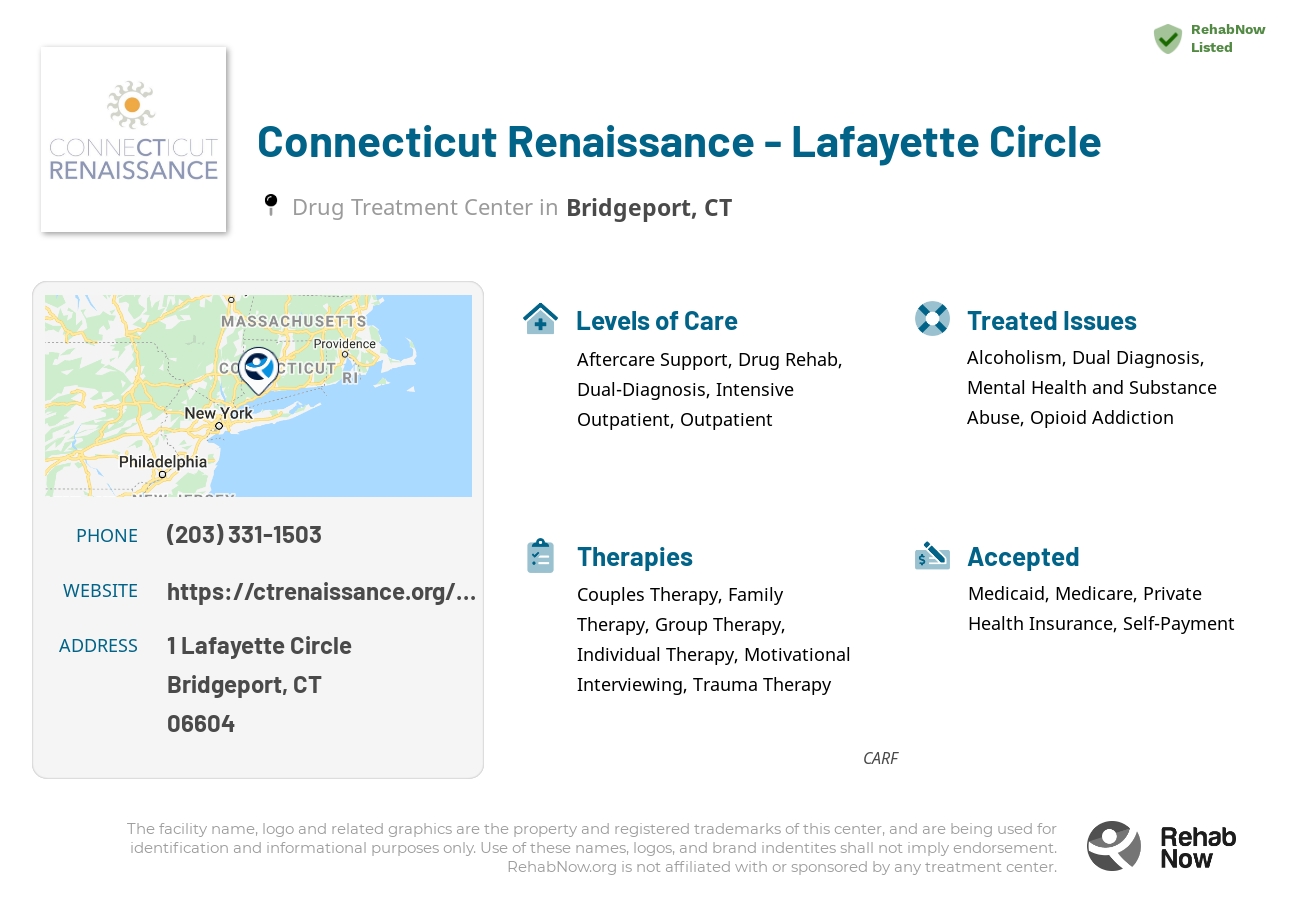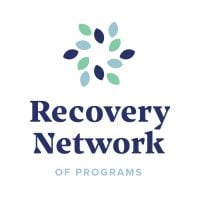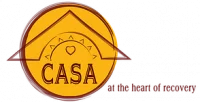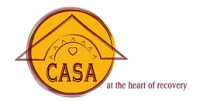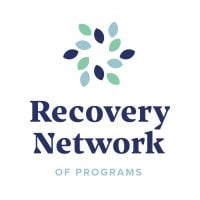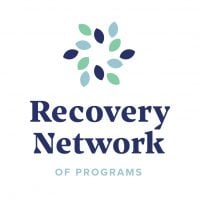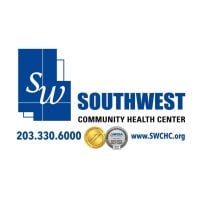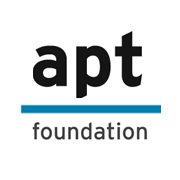Connecticut Renaissance - Lafayette Circle
Drug Rehab Center in Bridgeport, Connecticut
Connecticut Renaissance - Lafayette Circle provides comprehensive alcohol and substance abuse treatment services for adults and adolescents, using individual, family, and group therapies, as well as holistic therapies and aftercare services, to help clients maintain lasting sobriety.
About Connecticut Renaissance - Lafayette Circle in Connecticut
Connecticut Renaissance - Lafayette Circle is located in Bridgeport, Connecticut, and is a leading provider of comprehensive residential and outpatient alcohol and substance abuse treatment services for adults and adolescents. The organization is dedicated to providing a caring and supportive environment to individuals seeking to overcome addiction and substance abuse and is committed to providing individuals with the necessary tools for lasting sobriety. Through a specialized treatment plan, clients are provided with individual, family, and group therapies, in addition to educational and recreational activities.
Connecticut Renaissance - Lafayette Circle offers a variety of treatment options to individuals struggling with addiction and substance abuse, such as intensive outpatient programs, partial hospitalization programs, and one-on-one therapy. Clients are also provided with a range of holistic therapies, such as art and music therapy, and spiritual counseling, to help them explore and address the underlying causes of their addiction. In addition, the organization offers relapse prevention and aftercare services to help clients maintain their sobriety and prevent a return to substance abuse.
Connecticut Renaissance - Lafayette Circle is accredited by The Joint Commission, which is the highest level of accreditation awarded to addiction treatment providers. The organization is also licensed by the Connecticut Department of Mental Health and Addiction Services and the Office of the Chief Medical Examiner. In addition, the organization has been recognized by The National Committee for Quality Assurance and The National Association of Mental Health for its commitment to providing high-quality and innovative addiction treatment services.
Genders
Ages
Modality
Additional
Accreditations

CARF
The Commission on Accreditation of Rehabilitation Facilities (CARF) is a non-profit organization that specifically accredits rehab organizations. Founded in 1966, CARF's, mission is to help service providers like rehab facilities maintain high standards of care.
Conditions and Issues Treated
Opioid addiction treatment should be done in a medically supervised drug rehab. While taking opioids, users will typically use other substances to enhance the effects of opioids or to reduce the adverse effects of opioid use. Opioid addiction treatment will include detoxification and drug rehab counseling to help both the user and their loved ones learn how to live a successful sober lifestyle.
Treatments such as methadone, buprenorphine, and naltrexone are three medications that can help treat opioid addiction. These drugs work on the brain’s pleasure center and reduce cravings and the effects of illicit opioids such as heroin. These drugs can be either given orally or by injection. Individual drug rehab counseling sessions can be helpful to discuss any questions or concerns with the drug treatment program. This counseling will also help the user set goals for when they finish drug rehab.
Opioid addiction recovery is a long process. Many of the changes to the brain caused by opioid use cannot be undone, but with time and the proper treatment, a person can return to normal function. After detox, treatment will include drug rehab counseling and entering a halfway house or sober living community. Aftercare is critical to long-term recovery, as it helps the user avoid relapsing and entering back into drug rehab.
Levels of Care Offered
This center offers a variety of custom treatment tailored to individual recovery. Currently available are Aftercare Support, Drug Rehab, Dual-Diagnosis, Intensive Outpatient, Outpatient, with additional therapies available as listed below.
Intensive outpatient treatment is a type of comprehensive addiction care. Unlike conventional residential treatment programs, the patients live at home during the recovery process. This means that one can continue working and caring for their families. These also allow people to keep pursuing their studies while also working on their sobriety.
Outpatient treatment can help one transition to normal life from the round-the-clock supervision and treatment available during inpatient treatment. It is an excellent tool to ensure long-term recovery. However, it is essential to note that intensive outpatient treatment in itself does not remove patients from the real-world setting. This means there’s always a higher risk of coming across environmental triggers. To further prevent relapse, an outpatient treatment center should be able to provide ongoing support services.
Once the patient is enrolled in an intensive outpatient treatment program, they will be expected to attend therapy and group meetings daily for a stipulated period. The frequency and duration of each session will depend on the patient’s needs and level of addiction. This can help curb the habit and deal with underlying issues that led to it. Most of these professional treatments are designed to allow patients to structure their daily schedules in a way that is conducive to recovery.
“Outpatient treatment is ideal for those who have a lower intensity addiction. It’s also suitable for those with a supportive environment and those on a tight budget.
Outpatient treatment can be considered the lowest intensity level of addiction treatment. It is ideal for early phase addiction or lower intensity addictions. It may involve weekly sessions instead of daily. Peer group support, 12-step programs, and individual counseling may still be used and anti-addiction medication.
Aftercare support is vital to those who have completed a drug or alcohol treatment program. This support comes in individual and family counseling, treatment of psychiatric and other medical conditions, and medications to reduce cravings. It helps recovering addicts adjust to normal day-to-day activities and can last for a year or longer.
The majority of drug and alcohol addicts who receive aftercare treatment do not relapse. It is estimated that without aftercare, the relapse rate will be between 70 to 90 percent for most people. Aftercare is the final stage in addiction recovery, but it will also help maintain sobriety if relapse does occur.
Therapies & Programs
No single treatment works for all addicts; therefore, the goal of treatment and therapy should be to find what works best for each individual. Some people requiring addiction treatment may only need a few weeks of inpatient care. Others will require long-term residential care. Tolerance and withdrawal levels vary from person to person and thus affect the intensity of the treatment needed.
If an individualized approach to treatment and therapy is not offered, addicts may fail to reap benefits from their efforts. Professionals must customize plans according to their patient’s needs, limitations, and strengths. The goal of all forms of addiction treatment should be for addicts to find healthy ways to cope with their addiction and its underlying causes.
Couples therapy for drug addiction is a unique form of therapy that allows family members to work through the emotional issues of their loved one’s addiction together. Family members can support each other while learning how to cope with the addiction and encourage healthy changes.
Accordingly, couples therapy for drug addiction is designed for an addict and their significant other or spouse. The two will work with a therapist to learn how the addiction affects themselves and the relationship and how to break the negative patterns of behavior that may have developed.
Drug addiction can destroy a person’s life, as well as their family and friends. The loss of one’s ability to choose how to live and behave often leads the addict into depression, anger, guilt, and many emotional problems.
The therapies usually include siblings, children, and parents who are involved in their daily lives. These sessions are vital because they address past issues that may have hampered an addict’s or alcoholic’s recovery and provide support at a crucial time!
One of the most critical aspects of family therapy is helping addicts’ loved ones see their situation in a new light. It’s also one of the most challenging things a family can do when a loved one struggles with addiction or alcoholism.
Group therapy is held in a safe, controlled setting where patients can feel comfortable sharing their struggles and gaining perspective through shared conversations. It takes place in a group rather than one on one to prevent feelings of isolation or being unique in their situation while creating an environment for addicts at Connecticut Renaissance - Lafayette Circle to develop fellowship, accountability, and support. Group therapy is an important tool in recovery that prevents cravings that prompt a return to active addiction.
This type of therapy involves the use of a variety of therapeutic techniques to help addicts recover from past traumas that might have triggered their substance abuse. During these sessions, therapists will work with the addict to address painful memories and learn how to cope effectively with stressors as they arise.
During these types of sessions, therapists will typically focus on three main goals:
- Identifying and expressing painful emotions associated with past traumas.
- Reducing the effects of stress on an addict’s life by developing more effective coping mechanisms.
- Developing healthy ways of thinking about stressful situations that can help addicts avoid substance abuse issues in the future.
This type of therapy is typically used in conjunction with other types of addiction treatment services. By identifying and dealing with the root cause of addiction, most addicts can overcome their cravings and prevent relapse once they leave rehab.
Many different types of addiction treatment services exist to help addicts safely get sober, but it’s important for recovering individuals to find a therapist or support group that will help them address the root cause of their addiction.
Cognitive-behavioral therapy is a talking-based method that helps people struggling with addiction replace destructive behaviors with healthier ones. CBT also helps them identify the underlying thoughts and beliefs that cause these behaviors in the first place and ways to control those thoughts and feelings. It can be administered as a holistic therapy or as part of combination therapy and—as opposed to turning to drugs and alcohol—helps addicts learn how to respond to negative thoughts instead.
Payment Options Accepted
For specific insurance or payment methods please contact us.
Is your insurance accepted?
Ask an expert, call (888) 674-0062
Connecticut Renaissance Associated Centers
Discover treatment facilities under the same provider.
- Connecticut Renaissance - Waterbury West Treatment Program in Waterbury, CT
- CT Renaissance in Stamford, CT
- Connecticut Renaissance - Main Street in Bridgeport, CT
- Connecticut Renaissance - Wolcott street in Waterbury, CT
- Connecticut Renaissance - Central Avenue in Waterbury, CT
Learn More About Connecticut Renaissance Centers
Additional Details
Specifics, location, and helpful extra information.
Bridgeport, Connecticut 6604 Phone Number(203) 331-1503 Meta DetailsUpdated November 25, 2023
Staff Verified
Connecticut Renaissance - Lafayette Circle Patient Reviews
There are no reviews yet. Be the first one to write one.
Bridgeport, Connecticut Addiction Information
Connecticut has a higher rate of substance abuse and addiction than the national average. The state ranks in the top 10 in the country for illicit drug dependence among those ages 18 to 25. In 2010, there were 9,211 people admitted to an alcohol treatment facility for alcohol abuse combined with a secondary drug. Connecticut ranked fifth in the United States of America for the number of fatalities involving drunk driving in 2014.
10% of Bridgeport residents reported using illicit drugs. There were 2,737 drug-related incidents in 2019. Of these incidents, 1,964 were for illegal drug use or possession and 773 were for drug paraphernalia. 28% of people who abuse drugs are also alcoholics. Drug and alcohol rehab centers in Bridgeport offer a variety of treatment options that can help people recover from addiction.
Treatment in Nearby Cities
- Winsted, CT (51.9 mi.)
- East Canaan, CT (58.0 mi.)
- Brookfield, CT (23.9 mi.)
- Shelton, CT (10.9 mi.)
- New Britain, CT (39.7 mi.)
Centers near Connecticut Renaissance - Lafayette Circle
The facility name, logo and brand are the property and registered trademarks of Connecticut Renaissance - Lafayette Circle, and are being used for identification and informational purposes only. Use of these names, logos and brands shall not imply endorsement. RehabNow.org is not affiliated with or sponsored by Connecticut Renaissance - Lafayette Circle.



